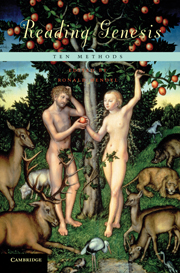Book contents
- Frontmatter
- Contents
- Contributors
- Acknowledgments
- Reading Genesis
- Introduction
- 1 Literature
- 2 Cultural Memory
- 3 Sources and Redaction
- 4 Gender and Sexuality
- 5 Inner-Biblical Interpretation
- 6 Rabbinic Interpretation
- 7 Interpretation in the Early Church
- 8 Translation
- 9 Modern Literature
- 10 Modern Theology
- Index of Biblical Citations
- General Index
- References
8 - Translation
Published online by Cambridge University Press: 05 June 2012
- Frontmatter
- Contents
- Contributors
- Acknowledgments
- Reading Genesis
- Introduction
- 1 Literature
- 2 Cultural Memory
- 3 Sources and Redaction
- 4 Gender and Sexuality
- 5 Inner-Biblical Interpretation
- 6 Rabbinic Interpretation
- 7 Interpretation in the Early Church
- 8 Translation
- 9 Modern Literature
- 10 Modern Theology
- Index of Biblical Citations
- General Index
- References
Summary
The topic of translation might seem an afterthought to any discussion of Genesis, a feature not of the Bible itself but rather of its “afterlife.” The book of Genesis, after all, is a record of beginnings; translations, by all appearances, come only later. But Genesis “itself” and its life in translation are not so easily separated. Our understanding of what the Bible is – as a whole and in its smallest details – has been profoundly shaped by translation, even as our experience and understanding of translation owe much to the Bible and its history.
“For Europe,” begins the opening essay in a recent collection on Translating Religious Texts, “the Bible has always been a translated book.” While such a statement mistakenly assumes the equivalence of Europe and Christendom, it remains the case that most of the Bible's readers – in Europe and outside of it, Jewish or Gentile – have known the Bible only in translation. The ramifications of this historical circumstance are hard to overstate. In being translated, the Bible also has been cast and recast, interpreted and rewritten: its obscurities “clarified,” its strangeness domesticated, its character transformed. Such transformations, I hasten to add, are inevitable. Even texts that remain in their own languages take on different colors in different contexts and eras as words acquire new meanings and lose old ones. In translation, this process is closer to the surface because two “equivalent” words in different languages rarely overlap precisely in their range of reference. From this perspective, the narrowest meaning of translation – as interlingual transfer or as the production of a linguistic equivalent – overlaps with the larger sense of translation as cultural transfer, which encompasses the full range of transformations that texts undergo in their movement from one cultural context to another.
- Type
- Chapter
- Information
- Reading GenesisTen Methods, pp. 157 - 175Publisher: Cambridge University PressPrint publication year: 2010
References
- 1
- Cited by



